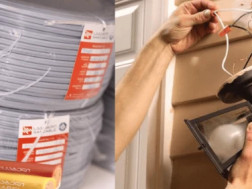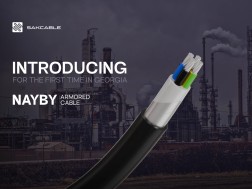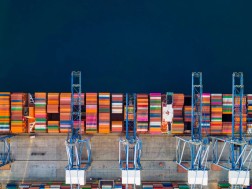In 1957, a group of 28 young people from Zestafoni, a city in Western Georgia, came to Ukraine to learn a trade new to their homeland. On their return, they launched Georgia's first cable production, which grew rapidly. The company, known as Sakcable, now offers 75 different types of cables and remains a market leader.
Davit Kapanadze, Sakcable’s managing director, credits the company's success to high-quality raw materials and skilled specialists. The company today has a total of eight showrooms in four cities in Georgia: Tbilisi, Batumi, Zestafoni, and Kutaisi. It also has three warehouse spaces, about 40 dealerships, and up to 300 partner stores.
Since 2018, all cable products have been rigorously tested in Sakcable’s accredited quality control lab, and updated to meet European standards, before being distributed locally and internationally.
Sakcable, able to meet international standards, has carved out a niche in the export market even amid competition from major producers, including companies in Turkey, Azerbaijan, and Ukraine. Last year, Sakcable's products, compliant with European standards and recommendations, were exported to EU member states.
"Increasing productivity was key to our export success. We invested in new machinery and capacity, and now we lead the Bulgarian market with top-quality, competitively priced products," Kapanadze said.
As Sakcable continued to grow, it aimed to make its processes more sustainable. Observing the global rise in renewable energy output, particularly that of solar energy, they also noted Georgia’s energy policy goal of sourcing 27.4% of the country’s energy from renewable energy by 2030.
With support from the European Union and the European Bank for Reconstruction and Development (EBRD), Sakcable found an excellent opportunity to pursue its sustainability goals. The EU4Business-EBRD credit line it obtained under the project is part of a joint initiative to support Georgian small- and medium-sized enterprises in financing investments, ensuring that companies receive support to invest in new equipment and technologies that meet EU directives. This, in turn, allows them to leverage the opportunities presented by the DCFTA, Georgia’s Deep and Comprehensive Free Trade Agreement with the EU, which was signed in 2014 and implemented in 2016.
In 2022, with the support, Sakcable invested 1.1 million Georgian Lari (EUR 377,000) to install solar panels on the roofs of its buildings in Zestafoni, said Kapanadze. He said the company Helios Energy installed a 500 kW solar power plant, and Sakcable now uses the generated solar energy in its production process, reducing its reliance on grid-imported electricity.
Due to this investment, today the solar power plant supplies one-third of Sakcable’s annual energy needs, lowering annual electricity costs and allowing the company to redirect the savings towards business development.
"Placing solar panels on the roof of our enterprise was the first step that Sakcable took in the direction of sustainable energy,” said Kapanadze.
“We support all initiatives that serve the development of alternative sources of renewable energy in the country, the ultimate goal of which is to improve Georgia’s energy security and reduce dependence on imports,” he added.
Going solar directly led to the creation of a new Sakcable product – the "Solar" cable, which is designed to be a reliable, long-term solar panel connector, said Kapanadze.
Certified by the Czech Electrotechnical Testing Institute, the cable meets European health, safety, and environmental standards, enabling the free trade of the product within the European market. European experts were involved in the cable’s development and testing process, carrying out a thorough examination of the entire production cycle, the cable’s characteristics, and the raw materials used.
For Sakcable, the "Solar" cable is just the beginning. With expanded production and capacity, the company aims to replace imports and compete internationally, proudly promoting their European-standard products made in Georgia.























